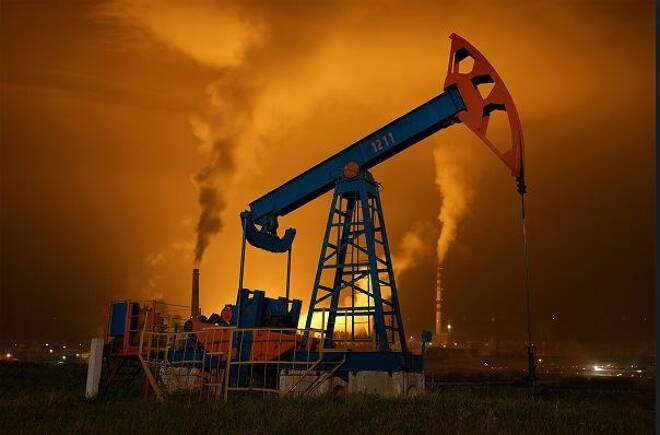Advertisement
Advertisement
Crude Oil Price Analysis for August 15, 2017
By:
Geopolitical risks subsided on but this did not stop the pressure on oil prices which moved lower on Monday. Despite declining inventories and softening
Geopolitical risks subsided on but this did not stop the pressure on oil prices which moved lower on Monday. Despite declining inventories and softening U.S. imports, prices have been unable to pierce through the $50 handle. Additionally, Libya announced today that it has stop loading oil cargo at the Zeuitina oil terminal, which did not seem to buoy prices.
Technicals
Crude oil prices moved lower declining by more than 2%, and pushing through support levels near an upward sloping trend line that comes in near $47.90. A break through this trend line would lead to a test of the July 21, lows at $45.40. Resistance on crude oil price is seen near the 10-day moving average at 49.04. Momentum has turned negative as the MACD (moving average convergence divergence) index generated a crossover sell signal. This occurs as the spread (the 12-day moving average minus the 26-day moving average) crosses the 9-day moving average of the spread. The index moved from positive to negative territory confirming the sells signal. The MACD histogram is now printing in the red with a downward sloping trajectory which points to lower prices for crude oil.
The Libyan Zueitina oil terminal has stopped loading cargos as port workers protest, demanding better working conditions. This means that oil coming from the fields around Zueitina will be stored at the port for the duration of the protest, reducing exports over the short term and will generate a spike in when the protest subsides.
Zueitina is managed by a joint venture between the National Oil Corporation, Occidental Petroleum, and Austria’s OMV. The port exports an average of six 600,000 to 630,000-barrel cargoes a month. The workers at the port are demanding to be paid 20 months worth of delayed salaries, as well as health insurance, annual leave, payments for overtime work, and more time for maintenance work.
At the same time, however, Libya’s overall crude output has been reduced by a decline in the production from its biggest field, Sharara. According to sources, Sharara’s output has fallen by 100,000 barrels a day over the last week, to 200,000 barrels per day at the moment. There has been an incident involving the theft of two vehicles property of Repsol, the company operating the field, at gunpoint.
Earlier this month, a militant attack on a control room at the port of Zawiya caused the gradual shutdown of Sharara, as the crude from the field flows along pipelines to Zawiya. This was the latest in a string of attacks on infrastructure that saw output from the country’s largest field suspended this year. It is possible that the 30-percent output reduction at the field now is a result of that last incident.
Japan GDP Was Stronger Than Expected
Japan’s Q2 GDP surged 4.0% in Q2 quarter over quarter following a revised 1.5% which was +1.0% growth pace in Q1. The increase in Q2 was much stronger than the 2.5% expected by analysts. Strong consumption growth led Q2 GDP growth, as private consumption improved 0.9%. Business investment grew 2.4% in Q2. Hence, domestic demand was quite firm in Q2, which was a surprise. Net exports were a modest drag on growth.
Chinese Industrial Production was Weaker Than Expected
Chinese reported softer than expected Industrial Production and Retail Sales on Monday, showing that the world’s second largest economy might have contracted in the Q3. Industrial production grew at a 6.4% year over year pace in July, down from 7.6% in June and below expectations that IP would increase by 7.1%. Retail sales increased at a 10.4% year over year, again falling shy of growth in June which was 11%, and lower than forecasts that retail sales would increase by 10.8%. Fixed asset investment, or spending on infrastructure and property, rose at an 8.3% year over year in the first seven months of the year, down from a forecast 8.6% rise.
UK Sentiment on the Economy is Weak
The UK economy has been and is likely to continue to underperform the Eurozone and other peers. The latest Reuters poll found a strong consensus among 70 analysts for the BoE to leave monetary policy on hold until 2019, and found that the consensus view was for UK growth to continue to lag Eurozone growth, with risk of recession pegged at 20% for the coming year. Fundamental Brexit uncertainties remain, and much will depend on the UK government, which continues to favor a “hard” exit, negotiating a transition period following the Brexit D-day in 2019, which would buy the UK the necessary time to negotiate a new trading deal with the EU.
About the Author
David Beckerauthor
David Becker focuses his attention on various consulting and portfolio management activities at Fortuity LLC, where he currently provides oversight for a multimillion-dollar portfolio consisting of commodities, debt, equities, real estate, and more.
Advertisement
